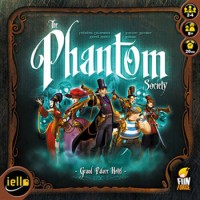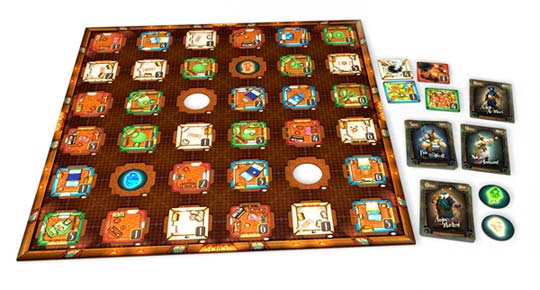
The Phantom Society
WELCOME TO SCOTLAND!
Yes, welcome to this country famous for its whisky, the Highlands, its castles, and, of course... its ghosts!
The Phantom Society is a ghost-hunting game in which you play as sly spirits seeking to ruin a manor hotel or, if you prefer, intrepid ectoplasm hunters (a bit destructive round the edges) who never flater in the pursuit of their prey. While the ghosts have to be cunning and use psychology in order to remain concealed, the hunters use observation and deduction to flush out their sneaky targets.
Who will be the fastest?
And above all, will the manor come through this madness intact?
From award-winning author Hervé Marly (The Werewolves of Miller’s Hollow, Skull & Roses...) and the new talent Frédéric Colombier, discover a super smart deduction game with an innovative 2-level game board and dazzling artworks from Naïade and Vincent Dutrait!

Features
- Clever game with innovative 2-level board.
- Asymetric 2-player or team game play based on deduction and deception.
- Impressive artwork by 2 renowned artists.
User Reviews (5)
Add a Review for "The Phantom Society"
You must be logged in to add a review.


I am a sucker for ghost-busting games. So, despite the simple nature of this game, I bought it. While it would never make the gaming table at my local meetup, it is a huge hit with my two girls (2 and 5) and if you want a cute family deduction game, I can’t recommend it higher (actually I can, but that is despite the point).
The game board consists of slots where you place “rooms” and each room has a number in lower right corner of its tile which represents the value of the room in thousands of pounds.
Players, both ghost and ghost-hunter, alternate placing one tile on the board. Once filled, the ghost-hunters leave to allow the ghost to place their haunts (four ghosts). The ghost hunters come back to find nothing amiss (slight component issue: make sure the ghost token is flush when placed, otherwise the covering room tile will be slightly elevated and an observant player will notice this.).
The ghosts need to remember their position and I recommend writing down the number of the room or coordinates or whatever helps you remember.
Players then take turns. The ghosts try to do as much monetary damage as possible by destroying rooms of high value. But they can only “haunt” or destroy rooms adjacent or diagonal of their hidden location. The ghost-hunters attempt to locate the ghosts by lifting one tile. However, in their veal they destroy the room with their ghost-hunting tools and thus provide additional damage for the grand tally of the ghosts (47 pounds worth of damage).
The ghost win if the amount of destroyed rooms equal 47 and the hunters win if they unveil all four ghost before that amount is reached. There is a bidding variant for more experienced players.
Pros:
1) Easy to learn.
2) Great for kids.
3) Nice component quality.
Cons:
1) Definitely a kid’s game.
2) Not much meat on these ghastly bones.
3) Largely abstract.
An infusion of theme and tactics would make this game so much better for older/experienced players. That said, for what it is, it is a fine addition to a family game night.
A swift opinion:
* Solid deduction game that plays quickly.
* Incredibly simple…perhaps a little too simple for the more tactical player.
* Basic mechanics let down the rather strong theme.
A video opinion:http://ow.ly/UcPgP
A wordy opinion: The Phantom Society is the game version of the hotel scene in the original Ghostbusters, and a standard game lasts about as long as the scene itself. Players divide up into two teams, one becoming spectres attempting to wreak havoc in the rooms of a luxurious hotel. The others take up the role of ghost hunters, sick of séances, attempting to bring the ghouls to paranormal justice with minimal collateral damage.
Before the game begins, the hunters close their eyes as a set of colourful ghosts hide under tiles of the same colour. On the ghost players turn, they’ll destroy a room adjacent to a hidden ghost as long as it’s the same colour and not blocked by other rooms. The Hunters on the other hand, will spend their turns searching rooms…by destroying them. Uncover a ghost however, and the hotel won’t charge them for the damage they caused and that ghost is out of commission forever.
The Hunters win if they catch all four ghosts. The ghosts win they manage to hit a certain amount of damage determined by adding up values on each wrecked room.
That’s it. It’s a swell little deduction game scaled down into about 10-15 minutes. It feels like it should be somewhat more dynamic, especially when you factor in some mechanics to add a layer of complexity to proceedings, especially when you factor in elements that are CRIMINALLY UNDERUSED.
You could determine who is in which team by bidding on which side you’ll take. You could use this to nail down exactly how much damage the ghosts will be trying to hit. Things is, the small amount of mechanical additions that come alongside the game involve such unnecessary faffing around considering how simple the game is.
Games involving hidden locations and deception are naturally theatrical, but as soon as you start simplifying them, they lose their dramatic flair. I don’t blame the designers for trying to add another layer of complexity in a bid to claw this back, but this just doesn’t feel like the right way to go about it, and The Phantom Society simply come across as a task found in the puzzle section of your local newspaper, and that’s a real shame.
With its glossy components yet Minesweeper like simplicity, The Phantom Society feels like a prize you would find in a Marks & Spencer Christmas cracker. If you’re looking for a simplified hidden movement or deduction game, I guess you’ll get the most out of it. If you’re looking for a good gateway game, I’d likely point you towards it if you had exhausted all other options…but those options are likely cheaper and frankly better. I’m not saying it’s a bad game, but it is perhaps the most average game I’ve ever played. Perhaps it earns a place on the shelf of your local limbo.
I had the pleasure of trying this game out last weekend, and will most likely make a purchase, for I enjoyed it greatly.
One player (or team of players) hide ghosts of four different colours UNDER the room tiles of the game board. A ghost may only be hidden under a room of the same colour (eg blue ghost under a blue room). All rooms has a value between 1-6, and the ghosts must together destroy rooms to a total value of 45 or more to win.
The game alters between the ghosts and the ghost hunters, starting with the ghosts. The player/team controling the ghosts flip a tile next to one of the ghosts and score that tile. Then it is the ghost hunters turn to try to guess where the ghost is hidden. Then a ghost of another colour must do the same thing, and this goes on until the ghost hunters have found all four ghosts or they managed to destroy at least 45 points worth of rooms.
The ghost hunters must use deduction and think hard about the history of hauntings in order to make educated guesses of where the ghosts may hide, and it is not an easy job. Finding one of the ghosts early on is a tremendous help, and even in that case it is hard to stop them in time.
Each game only takes about 15-20 minutes, and I think this is a great filler with great suspense. There’s also some extra rules for a bidding auctions between the teams on how many points they think they can get away with destroying as ghosts.
Try it, simple rules, hard deduction!
For me felt like “Minesweeper Jr.” the board game.
Deduction element was way too light for this to feel strategic or enjoyable for me. Further, as a player finds ghosts the game actually gets easier and easier with each ghost found because once a certain color ghost is discovered every room of that color is eliminated from suspicion (since there is only one ghost of each color and a ghost can only be under a tile of their own color).
In a two player game it was also very difficult to keep track of where each player’s ghosts were placed– and if they happen to forget the entire game is over. Might be a game better targeted to young children.
This game just did not do it for me. The deduction element as other people have mentioned is way too light. You can also just get stupid lucky and it’s not really fun for you or your opponent.
I unfortunately bought this full price, and really only played it 2-3 times. I’ve been very disappointing.
Its fortunately a simple game, and is easy to teach/learn. That however does not overcome the fact that it takes too long and is waaay to expensive for what you get out of it. I’d stay clear of this one.